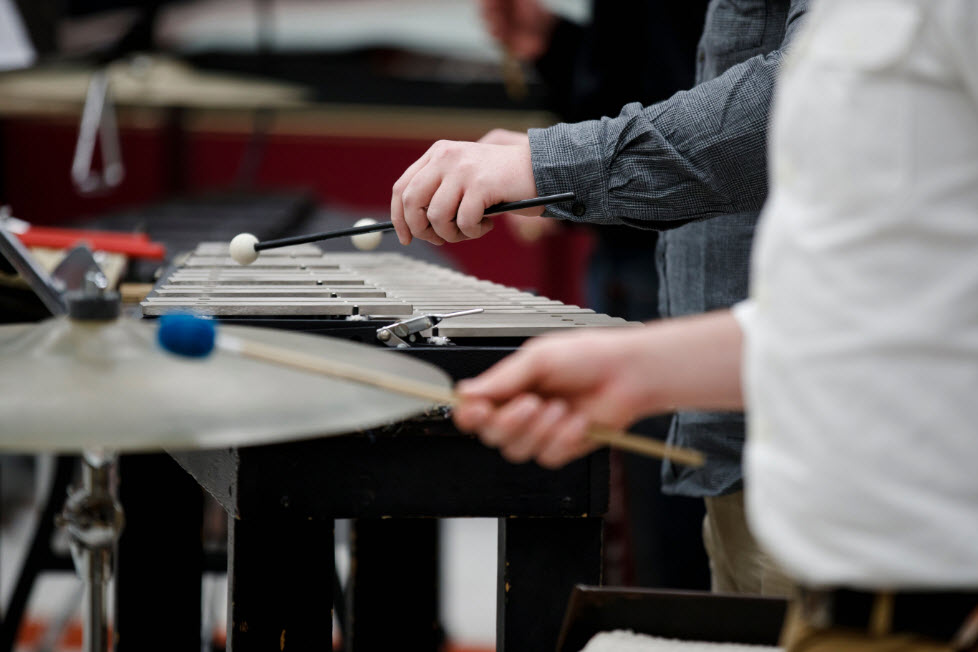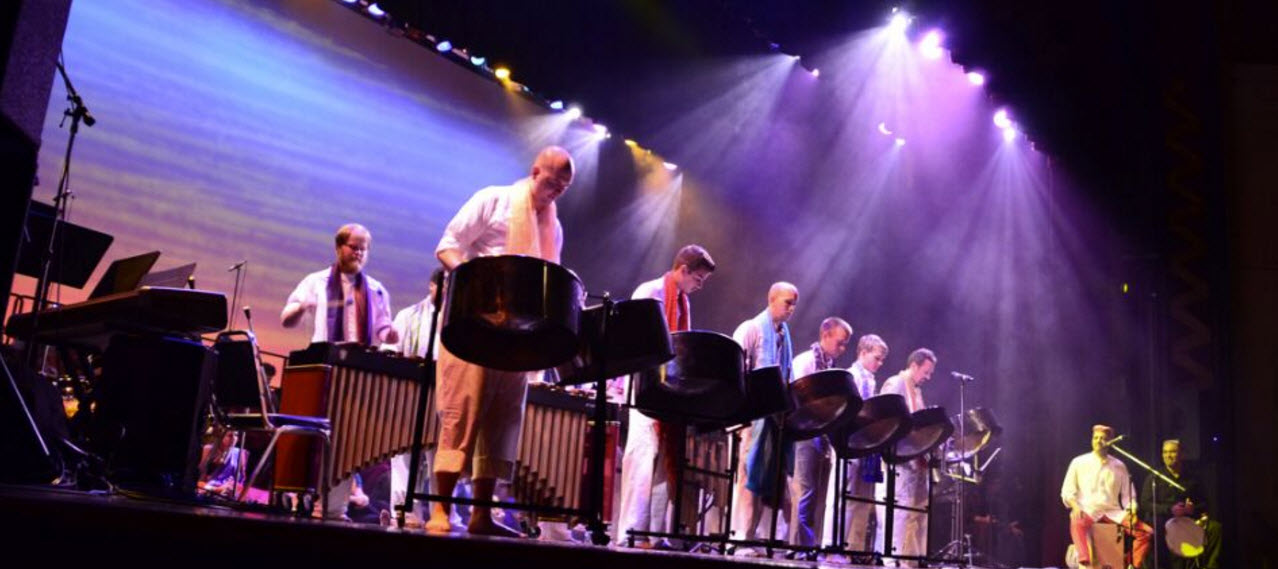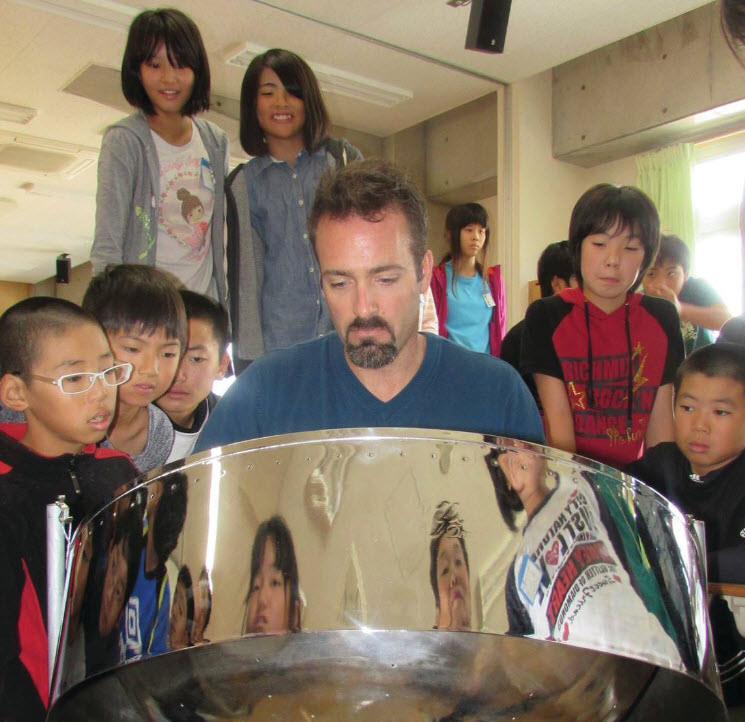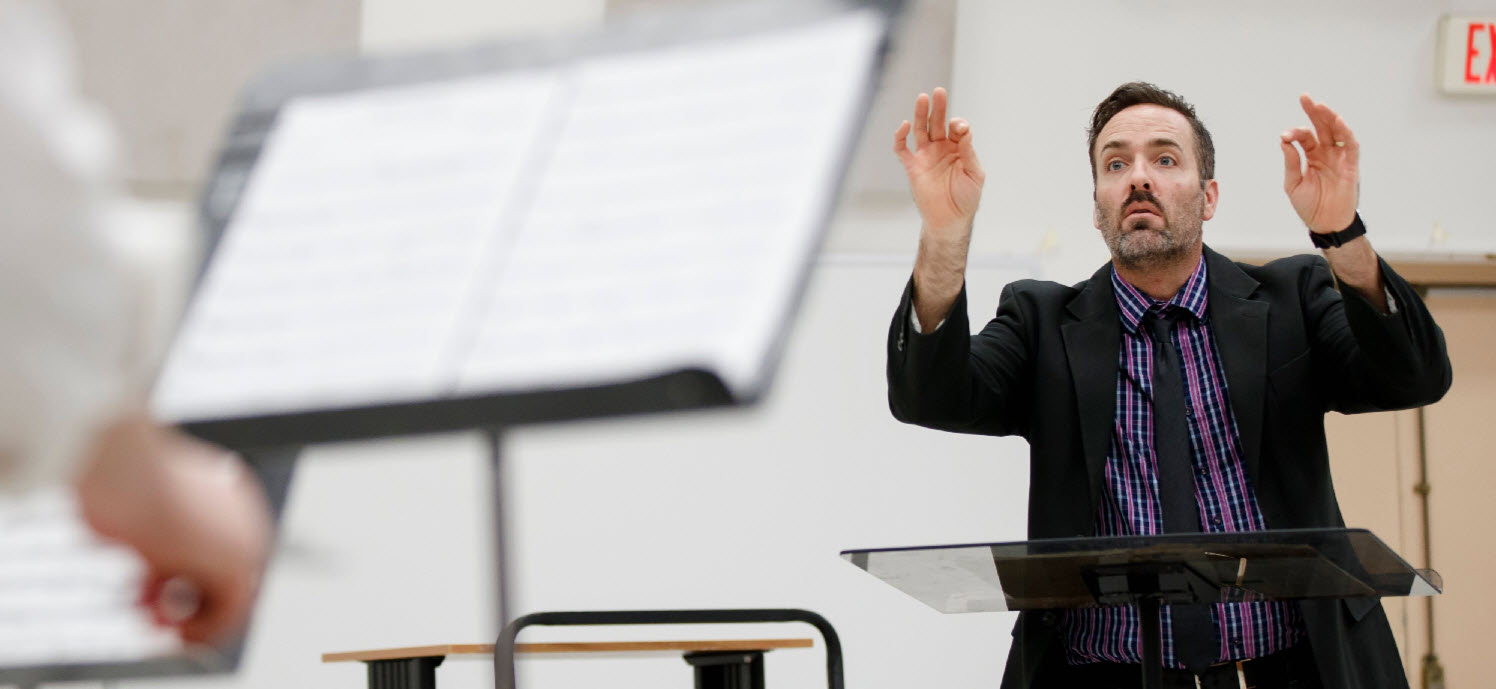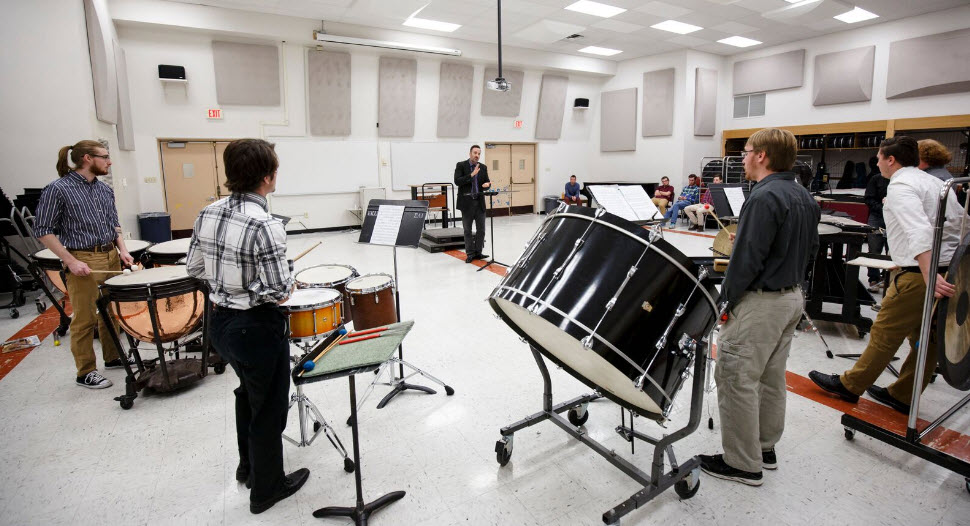Dr. Jason Koontz, ’96, Koontz plays African and Brasilian percussion with members of the EKU Percussion Studio during REC the Ravine in 2015, while his 4-year-old daughter plays shaker beside him.
He sees the transformation every time he takes percussion students on international trips, where they get the chance to learn from the masters in new and wildly diverse cultural settings. And the sight never gets old.
“It’s the coolest thing to see a student put in that situation,” said Dr. Jason Koontz, ’96, director of percussion studies at EKU. “Their first reaction is to be a little anxious. Then, after a day or two, they start to relax and open up. By the end of the trip, they’re hanging out on the corner with the locals and eating things they’ve never tried before.”
Just as many EKU academic programs are increasingly attuned to globalization, students in the School of Music’s unique percussion studies program can expect to travel, figuratively if not literally, to exotic locales as they hone their skills.
Soon after joining the Eastern School of Music faculty in 2000, Koontz set out to diversify the percussion studies program. That meant introducing more non-western styles to existing band and orchestral styles, and immersing his students not just in the music, but the cultures from which it sprung.
The best example of that is the emergence of the Steel Drum Ensemble as a well-traveled musical ambassador for Eastern. Besides trips all around Kentucky and the U.S., Koontz has taken his protégés to competitions and festivals in Trinidad and St. Lucia in the Caribbean as well as Brazil, and arranged for other visits to India and elsewhere.
“What sets this percussion program apart from others in the state is the fact that we are exposed to so many different kinds of world music on a daily basis,” said Katelynn Ward, a sophomore music education/music performance major from Greenville, Kentucky. “Because Dr. Koontz is so heavily influenced by world percussion, we are able to play many different kinds of music in a traditional format.”
Ward was part of an EKU group that traveled to St. Lucia in 2016 and, performing with the Laborie Steel Orchestra, won the national Panorama competition. “These are experiences I’ll never forget,” she declared. Those memories included a new way to learn music.
“At EKU, we learn music by reading sheet music,” she said. “In St. Lucia, members of the Steel Orchestra learn by rote; there is no sheet music. Learning parts of the performance piece in that way was a very rewarding experience.”
It’s that combination of curricular diversity and international experiences that gives EKU percussion students a competitive edge, whether on the performance stage or in any number of workplace settings.
Koontz provides lecture demonstrations at a Japanese elementary school in Hokuto City, Japan, in 2013 during an artist exchange for the Madison County International Club.
“It’s globalization on a musical scale, a complete education,” Koontz said. “The more diversity you have, the better you can collaborate outside your own daily sphere of influence. These international trips provide insight into a culture’s music, social studies, geography and language. With all the amazing diversity in food, geography and architecture, music becomes a small part of the experience.”
In January 2015 — students do love those midwinter Caribbean trips — Koontz and a small group of EKU percussionists participated in the Panorama Educational Program in collaboration with the Birdsong Steel Orchestra in Trinidad, just off the coast of Venezuela and birthplace of the steel band family of instruments. The students rehearsed and performed with a 120-member steel orchestra under the direction of Grammy Award winner and steel pan virtuoso Andy Narell at the world’s largest steel band competition.
Such experiences, Koontz said, allow his EKU students to “go to the source, learn from the masters and gain a new perspective on everything.” More importantly, perhaps, they provide EKU students with “a cultural and historical context, and insight into the music of Afro-Caribbean culture that helps to foster a curiosity and an understanding of diversity.”
The young EKU musicians also learned directly from Narell during their headlining performances at the Panorama Caribbean Music Festival at Virginia Beach, Virginia. Will Stephenson, ’10, a second-year graduate assistant under Koontz, has also joined musicians from all around the world to perform at numerous Global Rhythms concerts at Miami University in Ohio.
Stephenson’s first “major” experience with the EKU Percussion Studio was a trip to Brazil, where students studied the music and culture in Rio de Janeiro, São Paulo and Salvador de Bahia. Shortly after that trip, he and a fellow percussion student traveled to Chennai, India, to teach about steel drums and other types of Western percussion at the KM Conservatory for Music. As part of the Trinidad trip, he performed in the Panorama competition.
“All three were excellent opportunities, where I not only grew as a musician but as a person as well,” Stephenson said.
Interestingly, though he grew up an avid percussionist in school bands, Koontz didn’t originally pursue a career in music, instead beginning as a psychology major at Okaloosa-Walton Community College in his native Florida before transferring to Eastern. He credits former EKU School of Music Chair Rob James, who at that time was directing percussion studies, for his most fortuitous change of direction.
“After he invited me to play in some percussion ensembles,” Koontz recalled, “he sat me down and said I had a lot of talent and a good foundation, and that I needed to be a music major.”
Koontz and a percussion ensemble rehearse Phil Faini's "Bravura" in the Foster Music Building on Dec. 8, 2016
When, after earning two graduate degrees, he returned a few years later to join his alma mater’s music faculty, Koontz found James to be similarly supportive in his role as chair. “As a percussionist, he had a real good understanding of what it takes to run a successful percussion studio,” Koontz said. “There are so many logistics involved in moving and transporting instruments, so much equipment to organize and so many repairs.”
Sixteen years later, the rich diversity of the program and international exposure have combined to make EKU a popular destination for aspiring percussionists, with the program increasingly attracting students from a variety of states.
“People know our reputation for excellence,” Koontz said, “and that we are engaged in these international experiences.”
But he’s not about to let the program coast on that growing reputation.
“I’m open to anything,” he said, “always thinking about working out some new musical or educational arrangement.”
For example, he has discussed with a “good friend” from Guinea the possibility of setting up a workshop in that West African nation.
Such trips don’t come cheaply, of course, and much of Koontz’s time goes to securing funds to defray some of the students’ costs — at least the airfare.
Who knows what far-flung corners of the globe Koontz and his percussionists will visit next? Who knows what street corner on some tropical island will find an EKU student musician learning some new steel drum trick from a local master?
As Stephenson explained, “Dr. Koontz has a never-ending thirst to learn. He is always trying to learn how to play a new instrument, not limited to percussion, and dives full in trying new things. Through this, he shows his students that there is no end to what we are capable of, and instills a culture of learning and educational exploration.”
This article was also featured in the Spring 2017 issue of EKU Magazine.

